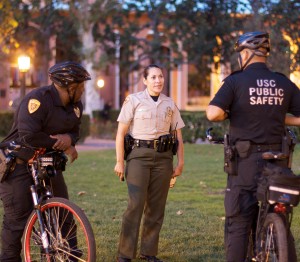Annual report shows theft increased at USC in 2011
The number of burglaries at USC’s University Park Campus increased by almost 30 percent in 2011, while robberies have nearly tripled from 2010, according to the federally mandated Annual Security and Fire Safety Report, released by the university last week.

Crime · Dept. of Public Safety officers monitor the University Park campus as part of the department’s overall effort to eliminate crime. DPS also stresses student awareness of dangerous situations as a key part of safety. – Caitlin Ito | Daily Trojan
Aside from the jump in robbery, burglary and weapon law referrals, crime on campus remained relatively stable and non-violent. Uncommon violations, such as arson and hate crimes, remained relatively consistent with previous years’ statistics, and murder, negligent manslaughter and non-forcible sex offenses were nonexistent.
Drug and liquor offenses even decreased significantly from 2010.
Statistics from 2012 have not yet been made available.
Dept. of Public Safety Capt. David Carlisle attributes the decrease in drug and liquor violations to an increase in shared responsibility between students and DPS officers, particularly on The Row.
“We have worked closely with the [Inter-Fraternity Council] in an effort to encourage responsible behavior on The Row,” Carlisle said in an email. “The fraternity leaders have been very cooperative in taking a position of responsibility including managing risk. We prefer that fraternities ‘police’ themselves and control irresponsible behavior such as toxic or underage drinking.”
The increase in self-policing among students seems to be working: Liquor law referrals decreased from 509 instances in 2010 to 293 in 2011 — a 42 percent drop — and drug law referrals slowed by about 32 percent, from 223 in 2010 to 152 in 2011.
Jordan Klein, a freshman majoring in computer science (games), approved of the relative passivity of DPS on The Row.
“On The Row, DPS only intervenes if they see someone [who] clearly needs help or is in bad condition,” Klein said. “They are less worried about the mass culture of drinking than they are about safety, and that’s good.”
But a much larger concern for students is theft. One hundred and forty eight robberies and burglaries occurred at USC in 2011, up from 99 in 2010. According to Carlisle, many burglaries are committed at bus stations around the perimeter of campus by burglars looking to take advantage of unsuspecting students.
 Vice President of Student Affairs Michael Jackson said he is all too familiar with this problem.
Vice President of Student Affairs Michael Jackson said he is all too familiar with this problem.
“Criminals look for vulnerabilities and try to take advantage of them,” Jackson said. “They know that when school is in session, we have lots of people in the USC communities with expensive technology.”
Carlisle said the solution to the university’s theft problem is common sense.
“Many of these thefts could have easily been prevented had students simply locked their doors,” Carlisle said.
Daniel Kim, a sophomore majoring in psychology, agreed with Carlisle.
“As students, we should be held responsible. Always be vigilant, always be alert, close the door when away. You just have to be careful, be smart about it,” Kim said.
Jackson shared the sentiment, adding that in residence halls, “students need to stop letting strangers tailgate them and come in the door. When we let strangers and non-students into our residence halls, that creates vulnerability.”
Carlisle stressed teamwork as another component of safety, and said he believes that the shared responsibility that often works on The Row can also apply to the larger community.
“We need all the members of the Trojan Family to work together to prevent crime,” Carlisle said. “A simple precaution such as locking your door whenever you are away, even if just for a moment, is important.”
Overall, however, Carlisle said DPS still has goals to reduce crime even more in upcoming years.
“We have made significant strides in crime reduction with substantial declines for several consecutive years,” Carlisle said. “An upturn was likely inevitable, but we will continue to analyze crime trends and develop strategies to address them.”
